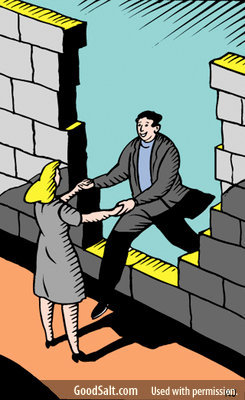“At my first defense no one stood with me, but all forsook me. May it not be charged against them.” 2 Timothy 4:16
In 2 Timothy 4, the apostle Paul is writing to his dear friend named Timothy. Paul was a dying old man as he wrote from prison in Rome to Timothy. He urged the younger man to visit him because he was lonely. We are learning from Paul some different causes and cures for loneliness. So far we have discovered that loneliness can be caused by transitions in life (2 Timothy 4:6-8) and separation from loved ones (2 Timothy 4:9-12, 21). The cures for these are utilizing our time wisely (2 Timothy 4:13) and recognizing God’s presence in our lives (2 Timothy 4:17a).
The third cause of loneliness is OPPOSITION (2 Timothy 4:14a). Although Demas had merely abandoned Paul (2 Timothy 4:10), Paul writes that “Alexander the coppersmith did me much harm.” (2 Timothy 4:14a).“It’s likely that this is the same Alexander in Ephesus who was a false teacher and whom Paul ‘delivered to Satan’ (1 Tim 1:19-20) because Paul warns Timothy, who was ministering in Ephesus, to watch out for him and his opposition to sound teaching (2 Tim 4:15).” 1
Paul is saying, “Not only am I getting old and sitting here alone in prison separated from my dear friends, but I have also been attacked.” We don’t know exactly what Alexander did. He may have vigorously opposed Paul at his trial. Maybe he slandered Paul’s name or attacked his reputation. Maybe he was turning people against Paul – we don’t know for sure. But to be vigorously opposed creates a very lonely feeling inside of us.
Remember when you were a little kid on the playground at school and everybody ganged up on you? “You are not our friend anymore!” they said.You felt opposed and you felt all alone, didn’t you? It is a painful experience to face opposition when everyone else is having fun. It is lonely to be misunderstood, to be embarrassed, and humiliated. The temptation is to build walls of protection around ourselves. But doing that only makes us lonelier.
We may harbor resentment toward those who have opposed us. We may want to get back at them and make them pay for the hurt they have caused us. The way Paul responds to the opposition in his life provides the third way to deal with loneliness: RELEASE THE HURT (2 Timothy 4:16). Don’t exaggerate your loneliness and don’t rehearse it over and over: “I’m so alone. I’m so alone.” Also, don’t allow the loneliness to make you bitter and resentful.
Paul said, “At my first defense no one stood with me, but all forsook me. May it not be charged against them.” (2 Timothy 4:16). Paul’s words are reminiscent of Jesus’ and Stephen’s words toward their enemies before they died (Luke 23:34; Acts 7:60).
Paul had a lot of time on his hands, but he did not have any time to become bitter and resentful. He chose to forgive those who wounded him. Paul knew that bitterness only makes you lonelier and builds a wall around your life because no one likes to be around a cynic – someone who is always resentful and complaining.
Paul is saying, “I want to be a better person, not a bitter person, so I will utilize my time, recognize God’s presence, and release my hurt.” Each of us has a choice as to how we respond to our circumstances. We can choose to focus on our feelings, or we can choose to focus on the truth. The truth is forgiveness frees us from past hurts.
All of us have been hurt and wounded by others, especially those we trusted. From beginning to end, the Bible emphasizes the importance of forgiveness. God even commands us to forgive (Ephesians 4:32). Therefore Jesus taught us to pray, “12 And forgive us our debts, as we forgive our debtors… 14 For if you forgive men their trespasses, your heavenly Father will also forgive you. 15 But if you do not forgive men their trespasses, neither will your Father forgive your trespasses.” (Matthew 6:12, 14-15). Forgiveness is so important because it is connected to God’s forgiveness of us. I cannot enjoy fellowship or closeness with God the Father if I am not willing to forgive those who have hurt me. Being unforgiving connects us to our past hurts and makes it difficult to fully enjoy the blessings of our relationship with God and with other people.
One of the ways we can know we have not forgiven someone is we keep rehearsing bitter and defensive thoughts toward those who have hurt us. We keep going “back to court” in our minds with all the things we wish we had said or want to say to them. 2 God invites us to release the hurt others have caused to us. Forgiveness requires the cancelling of a debt (cf. Matthew 18:21-35). Perhaps the person who has hurt us owes us an apology, justice, money, repentance, restoration, suffering, understanding, etc. God wants us to cancel the debt they owe us.
I am learning that there are three things that can hinder me from forgiving others: judgments, vows, and false beliefs. 3 When someone hurts us, we can hold on to judgments about them out of fear. We may judge their motives and try to read their minds. We tell ourselves, “He or she is evil, selfish, and does not care about me or love me.” Christ warns us about making such judgments (Matthew 7:1-2). These judgments can cause heart wounds that keep us from healing and growing. When we refuse to forgive that person, we can bind ourselves to the person we are judging and become more like that person.It is important to repent of our judgments and ask God to release the person and ourselves from the consequences. 4
Not only do judgments about our offenders hinder us from forgiving them, but so do the vows we make. Jesus opposed the practice of distorting vows so they could convey or conceal a lie (Matthew 5:33-35). We can make inner vows to survive the hurts we have suffered. For example, when a person I trusted hurts me, I may make an inner vow that says, “I will never trust anyone again!” Or “If I need others they will take advantage of me!” These types of vows can become self-curses that result in isolation and loneliness, which cause us even more pain. These inner vows can often become subconscious and do not disappear with time. They are like a contract that must be renounced or broken. It is important to ask God to forgive us and break these vows we have made. 5
False beliefs or lies can also prevent us from forgiving others. We may tell ourselves, “If I forgive them, they will get off the hook and there will never be any justice.” But the truth is, only God knows what is just (Romans 12:19). Or “If I forgive, I will become vulnerable to them again.” The truth is that just because you forgive them does not mean that they are safe, and you must trust them again (Matthew 18:15-18).
If you are struggling with loneliness because of unforgiveness, take some time today to ask God to reveal to you the people who have hurt you. 6 You may want to start with those closest to you (e.g., a parent, spouse, sibling, child, close friend, etc.). What wound did he or she cause to you? (e.g., abandoned, abused, betrayed, criticized, lied, neglected, rejected, etc.).
What are the judgments or things you believe about them? (e.g., they are evil, lazy, selfish, stupid, weak, didn’t love me, didn’t care for me, etc.). Repent of these judgments and ask God to release the person and yourself from the consequences (Matthew 7:1-2).
What vows did you tell yourself to survive the wound? (e.g., “I don’t need or trust anyone,” or “whatever I do, it won’t be enough,” or “all men/women are ______,” etc.). Renounce and repent of these vows, asking God to forgive you and to break them.
What effect did the wound have on you (How did you cope)? (e.g., anger, addiction, codependency, depression, food, isolation, stress, workaholism, etc.).
What debt do they owe you? What would they have to do for you to trust them again? (e.g., apologize, change their behavior, justice, make restitution, money, repent or seek your forgiveness, etc.). Talk to the Lord, asking Him to make you both willing and able to cancel their debt.
What false belief or lie is keeping you from forgiving them? Say the following false beliefs below to yourself to see if they feel true. If they do, then focus on the true beliefs until the false beliefs no longer feel true.
False belief: If I forgive them, they will get off the hook and there will never be any justice.
True belief: Only God know what is just (Romans 12:19).
False belief: Forgiveness means I must pretend that nothing ever happened.
True belief: Forgiveness is not denial. You must tell yourself the truth about what they did and how it affected you to really be able to forgive from the heart (Matthew 18:35; John 8:32).
False belief: If I forgive, I will become vulnerable to them again.
True belief: Just because you forgive them doesn’t mean that they are safe, and you must trust them again (Matthew 18:15-18).
False belief: My unforgiveness punishes them and is justified because I am right; they will never see their wrong and repent if I let go.
True belief: The truth is, it is God’s mercy and kindness that leads us to repentance. Only He knows what will change them (Romans 2:4; Ephesians 4:24-32).
If you are ready, insert the name of the person you have chosen to forgive into the following prayer of forgiveness:
Father God, Your Word says that to be forgiven, I must forgive. And so, I come to You in the name of Jesus, in obedience and love, and I bring (name) _____ before You. I cancel _____ debt to me (e.g., apology, change of behavior, humiliation, repentance, suffering, etc.). I choose to forgive this hurt against me, and I ask that You would not hold these sins against _____ on my account. I release _____ from any desire on my part to see _____ punished. In fact, as You have told me to do, I bless _____ in Your Son’s name, Jesus. You know _____ desires, needs, and hurts. You know what would bless _____. And so, I ask that You would pour out Your love and healing to _____ and bring _____ Your highest good, because Your name is Good and Love, and You are not willing that any should perish. Now also, Father, please heal my heart and set me free to love _____ as You do. In the mighty name of Jesus Christ, I pray. Amen.
ENDNOTES:
1. Tony Evans, CSB Bibles by Holman. The Tony Evans Bible Commentary (B & H Publishing Group, Kindle Edition, 2019), pp. 2220-2221.
2. Michael Dye, The Genesis Process: For Change Groups Books 1 and 2 Individual Workbook (Michael Dye/Double Eagle Industries, 2012), pp. 123-124.
3. Ibid., pp. 126-131.
4. Ibid.
5. Ibid.
6. The following steps are adapted from Ibid., pp. 129-132.
7. Adapted from Ibid., pg. 132.


